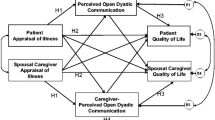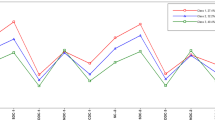Abstract
Dyadic adjustment and coping styles have been shown to predict levels of psychological distress following cancer diagnoses. This study examined the relationship between coping and distress in couples faced with prostate cancer, considering dyadic functioning as a third variable that potentially moderated or mediated the relationship. To investigate its influence on the success of patients' and spouses' coping efforts, both moderational and mediational models were tested using couples' composite dyadic adjustment scores. Only the moderational model was supported for patients: dyadic strength moderated the effects of avoidant coping and intrusive thinking on mood disturbance. Despite maladaptive coping, patients that were members of stronger dyads reported less distress than those in more dysfunctional relationships. Findings suggest that the relationship between coping and distress depends on the quality of dyadic functioning. Being part of a strong dyad may serve as a buffering factor, implying the need for psychosocial intervention for couples in maladjusted relationships.
Similar content being viewed by others
References
American Cancer Society (2002). Cancer Facts and Figures, American Cancer Society, Atlanta, GA.
Baider, L., Koch, U., Esacson, R., and Kaplan De-Nour, A. (1998a). Prospective study of cancer patients and the spouses: The weakness of marital strength. Psychooncology 7: 49–56.
Baider, L., Walach, N., Perry, S., and Kaplan De-Nour, A. (1998b). Cancer in married couples: Higher or lower distress? J. Psychosom. Res. 45: 239–248.
Baron, R. M., and Kenny, D. A. (1986). The moderator-mediator variable distinction in social psychological research: Conceptual, strategic, and statistical considerations. J. Pers. Soc. Psychol. 6: 1173–1182.
Burman, B., and Margolin, G. (1992). Analysis of the association between marital relationships and health problems: An interactional perspective. Psychol. Bull. 112: 39–63.
Carter, C. A., and Carter, R. E. (1994). Marital adjustment and effects of illness in married pairs with one or both spouses chronically ill. Am. J. Fam. Ther. 22: 315–326.
Ey, S., Compas, B. E., Epping-Jordan, J. E., and Worsham, N. (1998). Stress responses and psychological adjustment in patients with cancer and their spouses. J. Psychosoc. Oncol. 16: 59–77.
Gilbar, O. (1999). Gender as a predictor of burden and psychological distress of elderly husbands and wives of cancer patients. Psychooncology 8: 287–294.
Giunta, C. T., and Compas, B. E. (1993). Coping in marital dyads: Patterns and associations with psychological symptoms. J. Marr. Fam. 55: 1011–1017.
Gray, R. E., Fitch, M. I., Phillips, C., Labrecque, M., and Klotz, L. (1999). Presurgery experiences of prostate cancer patients and their spouses. Cancer Pract. 7: 130–135.
Hagedoorn, M., Buunk, B. P., Kuijer, R. G., Wobbes, T., and Sanderman, R. (2000). Couples dealing with cancer: Role and gender differences regarding psychological distress and quality of life. Psychooncology 9: 232–242.
Hoekstra-Weebers, J. E. H. M., Jaspers, J. P. C., Kamps, W. A., and Klip, E. C. (1998). Gender differences in psychological adaptation and coping in parents of pediatric cancer patients. Psychooncology 7: 26–36.
Jacobs, J. R., Banthia, R., Sadler, G. R., Varni, J. W., Malcarne, V. L., Greenbergs, H. L., Schmidt, J., and Johnstone, P. A. S. (2002). Problems associated with prostate cancer: Differences in opinion among health care providers, patient, and spouses. J. Cancer Educ. 17: 33–36.
Kurtz, M. E., Kurtz, J. C., Given, C. W., and Given, B. (1995). Relationship of caregiver reactions and depression to cancer patients' symptoms, functional states and depression—A longitudinal view. Soc. Sci. Med. 40: 837–846.
Litwin, M. S., Hays, R. D., Fink, A., Ganz, P. A., Leake, B., and Brook, R. H. (1998). The UCLA Prostate Cancer Index: Development, reliability, and validity of a health-related quality of life measure. Med. Care 36: 1002–1012.
Malcarne, V. L., Banthia, R., Varni, J. W., Sadler, G. R., Greenbergs, H. L., and Ko, C. M. (2002). Problems associated with prostate cancer: Differences in opinion among health care providers, patient, and spouses. J. Cancer Educ. 17: 148–152.
Manne, S. L. (1998). Cancer in the marital context: A review of the literature. Cancer Invest. 16: 188–202.
Manne, S. L. (1999). Intrusive thoughts and psychological distress among cancer patients: The role of spouse avoidance and criticism. J. Consult. Clin. Psychol. 67: 539–546.
Manne, S. L., Alfieri, T., Taylor, K. L., and Dougherty, J. (1999). Spousal negative responses to cancer patients: The role of social restriction, spouse mood, and relationship satisfaction. J. Consult. Clin. Psychol. 67: 352–361.
Manne, S. L., and Glassman, M. (2000). Perceived control, coping efficacy, and avoidance coping as mediators between spouses' unsupportive behaviors and cancer patients' psychological distress. Health Psychol. 19: 155–164.
Manne, S. L., Taylor, K. L., Dougherty, J., and Kemeny, N. (1997). Supportive and negative responses in the partner relationship: Their association with psychological adjustment among individuals with cancer. J. Behav. Med. 20: 101–124.
Manne, S. L., and Zautra, A. (1989). Spouse criticism and support: Their association with coping and psychological adjustment among women with rheumatoid arthritis. J. Pers. Soc. Psychol. 56: 608–617.
McNair, D. M., Lorr, M., and Droppleman, L. F. (1992). Manual for the Profile of Mood States–Revised 1992, Educational and Industrial Testing Service, San Diego, CA.
Nicholas, D. R. (2000). Men, masculinity, and cancer: Risk-factor behaviors, early detection, and psychosocial adaptation. J. Am. Coll. Health 49: 27–33.
Nijboer, C., Triemstra, M., Tempelaar, R., Sanderman, R., and van den Bos, G. A. M. (1999). Determinants of caregiving experiences and mental health of partners of cancer patients. Cancer 86: 577–588.
Northouse, L. L., Dorris, G., and Charron-Moore, C. (1995). Factors affecting couples' adjustment to recurrent breast cancer. Soc. Sci. Med. 41: 69–76.
Northouse, L. L., Mood, D., Templin, T., Mellon, S., and George, T. (2000). Couples' patterns of adjustment to colon cancer. Soc. Sci. Med. 50: 271–284.
Northouse, L. L., and Swain, M. A. (1987). Adjustments of patients and husbands to the initial impact of breast cancer. Nurs. Res. 36: 221–225.
Northouse, L. L., Templin, T., Mood, D., and Oberst, M. (1998). Couples' adjustment to breast cancer and benign breast disease: A longitudinal analysis. Psychooncology 7: 37–48.
Revenson, T. (1994). Social support and marital coping with chronic illness. Ann. Behav. Med. 16: 122–130.
Spanier, G. B. (1976). Measuring dyadic adjustment: New scales for assessing the quality of marriage and similar dyads. J. Marr. Fam. February: 15–27.
Weiss, D. S., and Marmar, C. R. (1997) The Impact of Events Scale-Revised. In Wilson, J. P., and Keane, T. M. (Eds.), Assessing Psychological Trauma and PTSD, Guilford, New York, pp. 399–411.
Author information
Authors and Affiliations
Corresponding author
Rights and permissions
About this article
Cite this article
Banthia, R., Malcarne, V.L., Varni, J.W. et al. The Effects of Dyadic Strength and Coping Styles on Psychological Distress in Couples Faced with Prostate Cancer. J Behav Med 26, 31–52 (2003). https://doi.org/10.1023/A:1021743005541
Issue Date:
DOI: https://doi.org/10.1023/A:1021743005541




